Middle East is at the verge of volcano-burst
Israel-Palestine war may engulf the entire region. Some of the new developments in the region are very serious and dangerous. I have analyzed this topic twice: November 8Israel vs. Hamas war, in the context of great powers and October 15 Israel vs. Hamas war. Despite numerous attempts in UNSC meetings, no confirmed resolution on ceasefire has been managed to make. The IDF ground troops are fighting with Hamas fighters and Israeli air attacks are continuing, disclosing more and more Hamas tunnels and other installations in Gaza.
As stated in my previous article regarding this war (October 15), the key question in this current war approaching apocalyptic dimensions, is this: local crisis or Black Swan of coming conflagration.
Stand up of Yemen Houthi
Houthi rebels from Yemen declared military support to Hamas by threatening air strikes on commercial, civil ships going to Israel via Read Sea. Houthis also carried out their threats by striking some cargo vessels. During a week, 299 ships with a total capacity of 4.3 million containers have changed course or are planning to do so to avoid the Red Sea. That is about 18% of global shipping capacity.
Yemeni militants known as Ansar Allah (Houthis) in conjunction with Yemen’s armed forces say their embargo imposed on the Red Sea will continue until a ceasefire is called in Gaza and humanitarian aid is permitted entry to more than two million people.
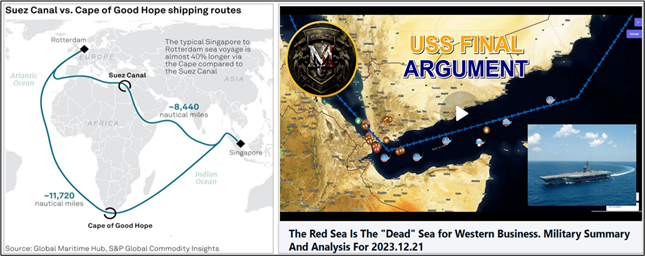
The Red Sea Is The “Dead” Sea for Western Business. Military Summary And Analysis For 2023.12.21
Since the launch of “Al-Aqsa Flood” operation by Hamas on the 7th of October and the subsequent Israeli military operation in Gaza Strip, what has perhaps been most notable is the response of Yemen to the ongoing crisis.
On the 31st of October, Yemen’s Ansar Allah movement (Houthis) launched a barrage of missiles towards the southern Israeli settlement of Eilat, with the group formally declaring the launch of a military operation in defense of Palestine shortly afterwards. In the following weeks, this military operation would expand to include further strikes against Israeli targets and would culminate in the closure of the strategic Bab al-Mandab Strait to all ships destined for Israel, with the group announcing that any vessel defying this order would become a target.
Numerous strikes took place in the region, as seen on the map below:
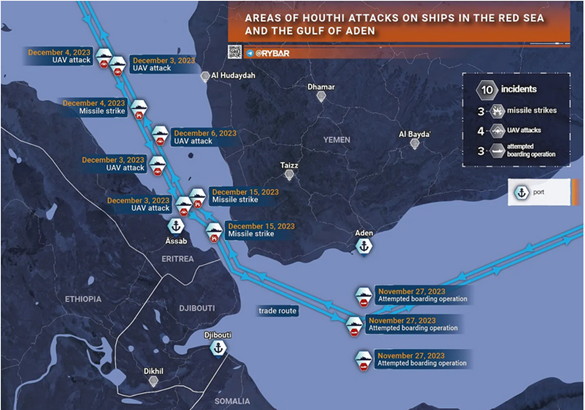
In response, a number of global shipping giants announced that they would no longer be travelling through the Red Sea en route to Israel and would be taking a far more costly route around Africa instead.
Operation Prosperity Guardian – mostly failed already
US Secretary of Defense Lloyd Austin announced plans to set up a multinational coalition to safeguard Red Sea shipping called “Operation Prosperity Guardian”, on December 19. During a trip to the Middle East in mid-December, he said the operations would be joined by Britain, Bahrain, Canada, France, Italy, the Netherlands, Norway, Seychelles and Spain. Austin added that Greece and Australia had also joined the grouping, taking it to a total of 20, but added that at least eight countries taking part have declined to be publicly named.
According to Lloyd Austin, some of the member countries will be engaged in patrols, while the others will provide intelligence support in the Red Sea and the Gulf of Aden. The operation will be led by the US Navy’s Fifth Fleet, Joint Task Force 153, which was established in April 2022 to enhance maritime security in the same waters.
Europe is facing the consequences of sanctions and war, suffering economic losses. Ukraine immigrants are a burden on some European countries. The food and energy security are in danger for almost entire Europe. Some of the European nations has already openly expressed their inability to join any such alliance. France has already withdrawn from the group that was supposed to protect Israeli ships from the Houthis.
The United States-led naval coalition announced on December 20 for deployment to the Red Sea purportedly to protect international commercial shipping has quickly run into troubled political waters.
Just before Christmas eve, European allies France, Spain and Italy are curbing their involvement, Australia has given it a miss and so far, no major Arab countries have signaled their participation, apart from the tiny Gulf Island nation of Bahrain which hosts the US Navy Fifth Fleet.
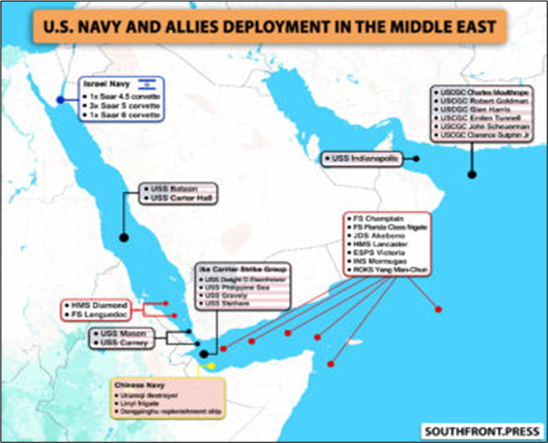
US Navy does not have enough warships to start Operation Prosperity Guardian against the Houthis. This is according to the maritime journalist John Konrad. He said that the US has built 24 littoral combat ships to be used for combat in coastal areas but the US has refused to deploy them. The US is confused and doesn’t know how to stop the Houthis.
The US is concerned about the cost of missiles used against Houthi drones, according to Politico, as the country is trillions of dollars in debt. According to US official, the US has used SM-2 missiles worth $2.1 million to intercept a Yemeni drone worth $2000. The US Navy has intercepted 38 flying objects so far.
The Houthis continue to maintain a blockade. If the US dares to attack the Houthis, they can retaliate immediately because they have torpedoes, drones, missiles and the most importantly, a direct support and intelligence data from Iran. The war may suddenly flare up and the Red Sea will be completely closed to all ships. It will be a huge blow to the economy in Europe.
After all, Russian and Iranian oil and gas tankers are reportedly navigating unhindered through the Bab el-Mandeb en route to the Suez Canal further north in Egypt. So, the Yemenis appear to be honoring their word that only ships associated with Israel are being targeted.
Nevertheless, other global cargo and tanker companies have opted to avoid the vital shipping lane, electing instead to route their vessels around Africa. That alternative route adds several days and significant transport costs. The Red Sea accounts for the passage of 12 percent of global shipping. Already, the transits are down by one-third in volume. That will inevitably rebound badly on Europe’s hard-pressed economies from supply chain shortages and consumer price inflation.
All this would dramatically deteriorate if the US-led armada starts firing on Yemen. That will mean the naval coalition would been seen by the Yemenis (and other Arab nations) as being deployed in support of Israel’s military operation in Gaza. The Yemenis have defiantly warned that they are prepared to launch anti-ship ballistic missiles and a suspected arsenal of thousands of drones to sink US and other warships.
If US and European warships start to sink in the Red Sea and Gulf of Aden all bets are off. We are then talking about a political crisis that compares with the Suez Emergency in 1956. That debacle ended in shame for the colonial powers Britain and France. Indeed, the 1956 Suez Crisis is cited as a watershed for the demise of these European powers and their pretensions of global power.
Hence, the European members of the U.S.-led flotilla are peeling away from the misguided venture. If Washington decides to go it alone, Biden takes a huge political risk in less than 10 months before the presidential elections. Biden can’t afford any further fiasco.
The Yemenis will give Washington a bloody nose, to say the least.
After Christmas, the world’s largest shipping company, Maersk, announces it will resume shipping in the Red Sea. The Houthis announced that all ships can move freely, except for those with Israeli connections or heading towards Israel. In addition, Yemen grants free passage only to tankers carrying Russian oil via the Red Sea to the Suez Canal. Western ships can either sail 15,000 miles around Africa, go via Russia’s Northern artic route or rail via Russia.
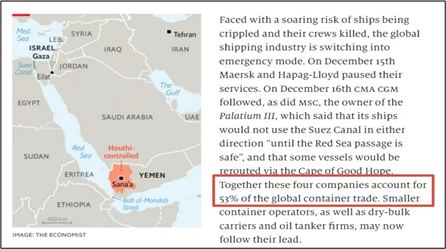
So far, the United States failed to stabilize the Red Sea and counter the threats from the Houthis. Major shipping companies are still unsure about using the Red Sea, despite the safety guarantees provided by the US Navy.
Military situation in Gaza
The war in Gaza is gradually taking on the appearance of a regional war. Reliable data of losses on both sides are nearly impossible to get from anywhere.
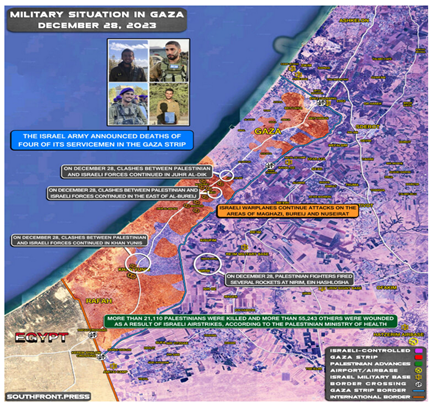
Although the intensity of the war in Gaza has remained unchanged for several days and the resistance in Gaza has declared that it could continue for months.
The Israeli military has called for the evacuation of a strip of land stretching across central Gaza that includes Bureij and Nuseirat camps and told the almost 90,000 residents and 61,000 displaced people in the affected areas to move southwards to the town of Deir al-Balah. However, the UN warned on Thursday that they had nowhere to go because Deir al-Balah was already overcrowded, with several hundred thousand displaced people sheltering there.
Widening war – Flurry of dangerous escalations
Fears are rising of a widened Middle East war and US troops are in the firing line. Escalating attacks on US troops and commercial shipping and incidents often involving Iran and its proxies are causing new concerns that Israel’s war in Gaza could widen into a regional conflagration with grave political and economic consequences. Other key fronts may quickly escalate.
Lebanon Front: The Israeli army is preparing for a military operation against Lebanon to keep Hezbollah away from the border. Thousands of Israelis have been displaced in the north and Israeli surveillance systems have been totally destroyed. The Israelis are therefore feeling very nervous and their only solution is a war with Hezbollah.
Yemen Front: While Hezbollah is causing Israel to lose human capital, the Ansarullah movement is dealing a blow to the Israeli economy by making the Red Sea expensive and dangerous for shipping companies. Yemen’s defence minister has warned of a major escalation if the war in Gaza does not end.
Iraq Front: As the Iraqi front has less direct engagement with Israel, things are getting tricky for the US. The Iraqi Prime Minister has said that Iraq plans to end the US presence in Iraq, which could give legitimacy to Iraqi resistance forces to inflict serious damage on US forces in Iraq and in Syria.
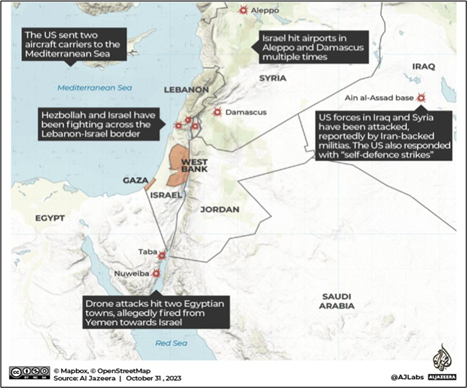
With American service personnel increasingly in a dangerous firing line and with US and allied naval assets on high alert after multiple drone attacks, the deteriorating situation is leading to a tense holiday period for the White House.
The rising possibility of US combat deaths and the worsening security situation from the Indian Ocean to the Red Sea and stretching through Iraq, Syria, Lebanon and Israel represents an unwelcome new foreign crisis as President Joe Biden’s reelection year dawns. Warnings by Israel that its war against Hamas in Gaza will last for months, threaten to heighten the chances war could spin out of control and drag the US further in.
Iraq kicks out US military. Iraqi Prime Minister Al Sudani announced the end of the presence of US and the coalition’s presence in Iraq, citing sovereignty concerns amid escalating tensions. “We are in the process of reorganizing this relationship. Our government moves to end international coalition presence in Iraq.”
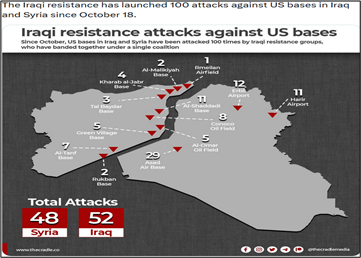
Initial anxiety that a regional war could erupt after Hamas’ October 7 attack on Israel didn’t immediately materialize even amid limited exchanges between Israel and Hezbollah forces in Lebanon.
The flood of fresh incidents underscores the potential for a dangerous escalation of the war, reveal the extent to which US forces are directly exposed and help explain increasingly urgent appeals from Washington for Israel to scale down the war in Gaza. Any future incidents in which US soldiers are killed or naval assets are seriously damaged would leave Washington little choice but to get sucked deeper back into the Middle East.
The Israel-Hamas war is a part of the “Big Picture in the Middle East”
Israel – Iran relation
The Iran-controlled strategy is to get regional influence and power through groups or proxies like Hamas, Palestinian Islamic Jihad, Hezbollah, Kataib Hezbollah and the Houthis. If Iran actually takes the gloves off and turns loose the proxy forces with all of their might, the US troops there have a real regional problem, especially in Iraq and Syria.
Republicans have long accused Biden of not taking sufficient action to deter such adversaries but the Biden administration has taken pains to try to avoid escalating a fraught moment into a bigger war. The situation for US troops in Iraq and Syria is especially dangerous as they are within easy reach of militant groups that are loyal to Iran.
The Israeli assassination of senior Iranian Islamic Revolution Guards Corps (IRGC) commander Brigade General Seyed Razi Mousavi has raised tensions in the Middle East and brought the region closer to a dangerous confrontation. Mousavi was killed on December 25, when a strike attributed to Israel hit his home in the town of Set Zaynab to the south of the Syrian capital, Damascus. The IRGC revealed that Mousavi was in charge of providing “logistical support to the Axis of Resistance in Syria.” It also said that the commander was a close “companion” of late Quds Force commander Major General Qasem Soleimani, who was assassinated by the United States in Iraq around four years ago.

Economic and military reverberations – Israel & US relations
A broadened conflict could have painful economic consequences given the Red Sea’s critical importance to global supply chain routes for energy and goods. The waterway is bordered on its eastern flanks by Yemen and Saudi Arabia and to the west by Eritrea, Sudan and Egypt. It feeds into the Suez Cana at the Sinai Peninsula, which belongs to Egypt and borders Israel.
The potential for disruption in the canal, which offers the shortest sea route between Europe and Asia, was laid bare, when a ship got stuck across its breadth in 2021, causing global reverberations.
Houthis have launched at least 100 attacks against 12 different commercial and merchant vessels in the Red Sea over the last month, in a “very significant breadth of attacks” not seen in at least “two generations,” a senior US military official said last week.
Houthis have reportedly done grave damage to Israel’s economy: Israel’s southern port Eilat has suffered badly since this crisis. Port revenues have dropped 80% due to Houthi attacks.
The possibility of military action in the Middle East is the last thing that Biden — who is already deeply invested in trying to save Ukraine from a Russian onslaught — would have hoped to be dealing with as 2024 begins. Any impression that the president is struggling to exert authority on a world that sometimes seems to be spinning out of control could be politically detrimental at a time when Biden is plagued by approval ratings of less than 40% — perilous territory for a commander-in-chief seeking reelection.
This tenuous political reality was the backdrop to fresh consultations between the Israeli government and the Biden administration on Tuesday. This came after intense fighting erupted in Gaza between Israeli troops and Hamas forces following days of US calls for a less intense phase in the conflict.
Ron Dermer, one of Prime Minister Benjamin Netanyahu’s top confidants, met with officials in the White House and State Department. Netanyahu had earlier visited troops in Gaza and declared a “long fight” lay ahead. Israel’s Defense Minister Yoav Gallant meanwhile declared that his country was in a “multi-arena war, we are being attacked from seven different sectors,” he said, referring to Gaza, Lebanon, Syria, the West Bank, Iraq, Yemen and Iran. That is a scenario that the United States, and Biden especially, cannot allow to become a long-term reality.
Framework of great power politics and vital transport routes worldwide
Yemen Houthi issue has suddenly become a “larger-than-life issue”. From the western viewpoint, Yemen Houthis are poor rebels in war-torn, low-developed country and they are generally seen as military proxies for Iran.
The issue is that Yemen’s Houthi have decided that all ships using the Red Sea that have any connection, near or far, with Israel, are legitimate targets for its batteries of missiles. NATO’s problem is how to deal with the Houthi, whilst also marginalizing China, Iran and Russia, all three of which have very big dogs in this very important fight.
An interesting statement, worth to read, in X-media(Twitter): American Options To Stop Yemeni Threats In The Red Sea Are Practically Impossible To Implement. On 17-December- 2023, byAl Masaa Press| Yahya Muhammad Al-Sharafi.
Yemen’s resistance movement has made it very clear that any Israel-affiliated or Israel-destined vessel will be intercepted. While the west bristles at this and imagines itself a target, the rest of the world fully understands that all other shipping is free to pass. Russian tankers – as well as Chinese, Iranian, and Global South ships – continue to move undisturbed across the Bab al-Mandeb and the Red Sea.
Yemen’s carefully targeted blockade of the Red Sea shows the way to The War of Economic Corridors. Russian President Vladimir Putin is now sending an unmistakable message: Forget the Suez Canal. The way to go is the Northern Sea Route, which the Chinese, in the framework of the Russia-China strategic partnership, call the Arctic Silk Road.
From a geopolitical perspective, the US has strong reasons to dominate the Red Sea where China has a naval base in Djibouti and Washington has been fueling the civil war in Sudan to keep the country on the boil and block Russia’s plans to set up a submarine base. Another littoral state Eritrea occupies a key strategic position on the eastern side of the Red Sea, which has strong economic, diplomatic and military ties with China and Russia.
Indeed, the US efforts failed miserably to overthrow the democratically elected Prime Minister Abiy Ahmed of Ethiopia, the largest country in the Horn of Africa, who is aligned to Russia. Suffice to say, the US has not a single friend or ally left today in the entire eastern part of the Red Sea.
When considering Middle East – North Africa region together with relevant Indian ocean areas, it is very easy to understand that the real issue is the great power politics and vitally important transport routes worldwide.
At first glance, it seems NATO is prepared to play this game through to the end, not only in the Gulf of Suez, the Gulf of Aqaba and the other West Asian choke points the Houthi and their allies have a presence in but much further afield to the Strait of Malacca and the Taiwan Strait as well. But… as evident is that China, Russia, Iran and India have very heavy word to say in this game as well.
The United States has this week announced a multinational navy task force to counter Yemen’s blockade of the Red Sea. The US also warned it is prepared to hit the Arab country with military strikes in retaliation.
The stakes are high. The Yemenis have the vital Red Sea global shipping route under their command from controlling the narrow Bab el-Mandeb strait that flows out to the Indian Ocean. The impact of closing this chokepoint on global trade is eye-watering. Hence the Americans and their European allies have sprung into action with threats of retaliation.
The Yemenis warned that they have ballistic missiles to sink any warship or submarine that the US and its allies deploy in the region. The Yemenis added they will continue blocking cargo vessels using the Red Sea route until the crisis in Gaza stops. The Americans are trying to make out that the Yemenis are acting like criminal sea pirates and the US-led task force is nobly serving in the interests of international commerce and peaceful navigation. Washington and its allies cannot publicly admit that their actions are in support of Israel.
The prominent thing is that there are no other Gulf Arab nations involved in the task force, except Bahrain. Egypt is absent even though it is a major Red Sea coastal nation as is Saudi Arabia. If Operation Prosperity Guardian were really about protecting commerce and international shipping then, why aren’t Red Sea Arab states joining up? Of course, they are not, because the real purpose of the task force is to aid Israel.
If Arab states were to join the U.S.-led naval force then it would be politically fatal for the rulers of these states. That would make America’s Arab allies unstable from internal revolt and perhaps even risk their total collapse. The Arab pillars of the US empire are at risk of falling.
The last thing Biden wants is to torpedo his electoral chances by starting a broader war in the Middle East involving US forces directly. The Yemenis know the Americans are bluffing, like the whole US initiated Operation Prosperity Guardian.
Bab el-Mandeb translates as “the gateway of tears”. The Americans and their European allies will be the ones shedding the tears.


